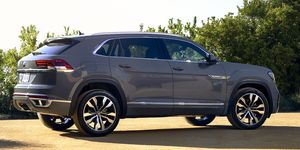Volkswagen sold 81,508 Atlas three-row SUVs last year. That makes the Atlas the success that the company has been hoping for since it opened its Tennessee factory in 2011 in an attempt to produce vehicles better tuned to the tastes of the United States market. In its push to snag an even larger slice of the SUV space, VW is now offering a two-row, five-seat version called the Atlas Cross Sport.
It’s a straightforward conversion from Atlas to Atlas Cross Sport. In the name of perceived sportiness, out goes that most minivan of things: the third row of seats. Without a third row to package, the Cross Sport’s roofline drops off sooner and the hatch can take a more aggressive, Audi Q8-like angle. Very sporty. No third row also means the second row can grow. The split-folding bench seat in the Cross Sport slides back farther than in the larger Atlas, opening up an additional three inches of legroom. Maybe that’s where the Cross in its name stems from. Go ahead and cross your legs back there.
Under the new roofline, behind the revised grille flanked by LED headlights, and beneath the redone rear fascia with LED taillights, the Cross Sport is pure Atlas. Overall length is down a couple of inches, but the 117.3-inch wheelbase stays the same. Base versions get a surprising punch from VW’s turbocharged 2.0-liter inline-four. While the standard four-cylinder has a less-impressive growl than the optional 3.6-liter V-6, the turbo does help it produce 258 lb-ft of torque from just 1600 rpm, and 235 horsepower isn’t too far off the optional V-6’s 276 hp. Previously, all-wheel drive was only available with the V-6, but the Cross Sport offers all-wheel drive with either engine for $1900. VW reps tell us that regular Atlas models will soon get the option of all-wheel drive with the turbo-four engine, as well as adopt the Cross Sport’s styling updates.
Smaller yet Familiar
Even with all-wheel drive, the 2.0-liter provides good acceleration. The standard eight-speed automatic transmission, however, still features a short first gear that both engines stumble through when pulling away from a stop. The six is smoother than the four, but the difference isn’t enough to completely dismiss the 2.0-liter. What you get for upgrading to the six for $1600 is the ability to tow 5000 pounds; the turbo-four is rated to tug only 2000 pounds.
Driving the Cross Sport is pretty much the same as driving an Atlas with its third row folded. Sharp impacts still produce the same thunks from the front suspension, and the instrument panel is nearly identical except for some minor trim differences. In the Cross Sport, you sit on the same seats and look at the same hard plastics and underwhelming switchgear as you do in the Atlas. A few new interior colors, including contrasting red seats, are available in an attempt to liven things up. Both blind-spot monitoring and automatic collision warning with emergency braking are standard. The Cross Sport also brings newly available technology to the Atlas lineup, including road-sign recognition and dynamic cruise control that has the ability to deal with stop-and-go traffic.
Base versions with the four-cylinder and front-wheel drive start at $31,565, or $1000 less than its larger sibling. A loaded SEL Premium model with the 2.0-liter will set you back $48,965. Opting for the V-6 locks you out of the lowest trim levels, S and SE. Should you want the six, you have to start at the SE w/Tech. A front-driver with the 3.6-liter comes very well equipped for $38,765, and it’s possible to creep just past $50K for an SEL Premium with the V-6.
Volkswagen sees the Cross Sport’s competition as the Ford Edge, the Jeep Grand Cherokee, and the Honda Passport. To that list we’d add the Nissan Murano and the Chevrolet Blazer. Premium brands also offer two-row SUVs in this price range, but you’ll have to sacrifice size in exchange for a snootier badge. We’ve previously chosen the Passport as a comparison test winner and the pick of this class. The Cross Sport is unlikely to upset that order. But it is compelling compared to the older entries in its class. If you’re taken by the Cross Sport’s exterior design and its massive rear-seat space, don’t let us stand in your way.
Source: Reviews - aranddriver.com





